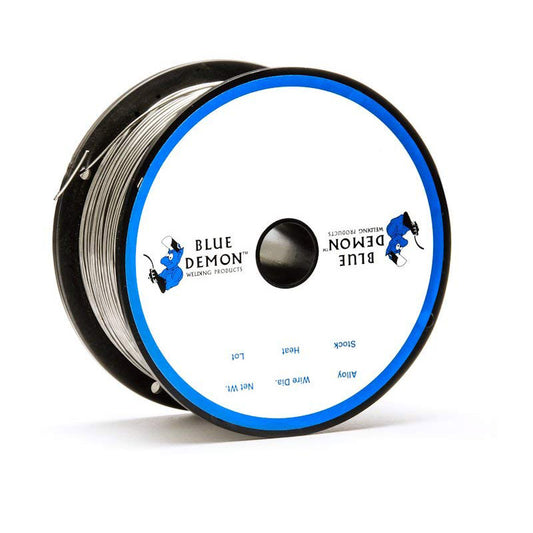When it comes to welding, choosing the right wire is crucial for achieving strong, reliable welds. Two of the most common types of welding wire used in MIG (Metal Inert Gas) welding are flux-cored wire and solid wire. Each has its own advantages and best-use cases, depending on your welding needs. Let's break down the key differences between these two types of wire and help you determine which one is right for your project.

What is Solid Wire?
Solid wire, also known as solid MIG wire, is a single, continuous wire that requires a shielding gas to protect the weld pool from contaminants in the air. This wire is commonly used for clean, precise welds on thinner materials, making it a popular chose for automotive, fabrication, and general manufacturing applications.
Advantages of Solid Wire:
- Cleaner welds - Produces minimal spatter, reducing cleanup time.
- Great for thin materials - Works well on mild steel, stainless steel, and aluminum.
- Good for indoor use - Requires a shielding gas, making it best suited for controlled environments.
- Smooth arc performance - Creates a stable arc with good penetration and minimal defects.
Considerations for Solid Wire:
- Requires shielding gas - A separate gas supply (typically a mix of argon and CO2) is necessary.
- Less effective outdoors - Wind can blow away the shielding gas, leading to contamination.
- Not ideal for dirty or rusty materials - Works best on clean, properly prepared surfaces.
What is Flux-Cored Wire?
Flux-cored wire is a tubular wire filled with a flux compound that acts as a shielding agent when heated. This eliminates the need for an external shielding gas, making it ideal for outdoor applications, heavy-duty projects, and dirty or rusty surfaces.
Types of Flux-Cored Wire:
Shelf-Shielded Flux-Cored Wire (FCAW-S): Does not require an external shielding gas and is great for outdoor and field applications.
Gas-Shielded Flux-Cored Wire (FCAW-G): Requires an external shielding gas, but provides a smoother arc and deeper penetration, making it ideal for industrial applications.
Advantages of Flux-Cored Wire:
- Great for outdoor use - Can be used in windy conditions without shielding gas.
- Better for thicker materials - Provides deeper penetration for welding heavy steel.
- More forgiving on dirty or rusty surfaces - The flux helps clean the weld area as you work.
- Higher deposition rates - Allows for faster welding speeds in industrial applications.
Considerations for Flux-Cored Wire:
- More spatter and slag - Requires cleanup after welding.
- Can be more expensive - Depending on the type of flux-cored wire.
- Less precise welds - May not provide the clean finish needed for fine automotive or fabrication work.
Which One Should You Choose?
The choice between flux-cored and solid wire depends on your welding needs:
- For clean, precision welding on thinner materials (like automotive and general fabrication): Solid wire with shielding gas is the best choice.
- For outdoor or heavy-duty welding on thicker materials (like structural welding or farm equipment repair): Flux-cored wire is the better option.
Regardless of which wire you choose, having the right equipment and expertise is essential for high-quality welds.
If you have any questions about which welding wire is best for your project, the experts at Baker's Gas and Welding are here to help! Give us a call at 877-930-5690 or email us at support@bakersgas.com for all your welding needs!




